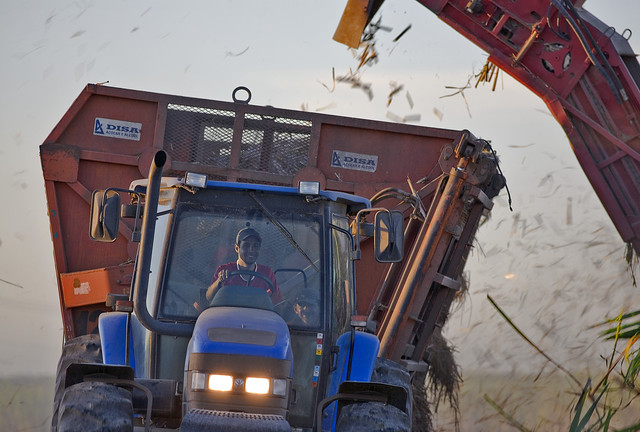http://e-info.org.tw/node/116531
減碳兼顧糧食安全 研究:生質燃料不搶糧
文字大小
37 1 Share1
本報2016年6月22日綜合外電報導,姜唯編譯;蔡麗伶審校
環保人士認為,倉促靠生質燃料減碳,可能威脅貧窮人口的糧食來源;然而,十間學術機構上週聯合發表新研究指出,用玉米當作生質燃料與糧食安全並不衝突,甚至有助於糧食安全。
巴西一個農場正在收割甘蔗,作為生質燃料。圖片來源:Sweeter Alternative(CC BY-ND 2.0)。
2008年糧價暴漲主因是生質燃料? 學者:另有原因
主要作者、橡樹嶺國家實驗室(Oak Ridge National Laboratory)科學家克萊恩(Keith Kline)說:「我們一開始也是這麼認為。」但是資料卻呈現相反的結果,「投資生質燃料似乎可以改善土地管理方式,為產業帶來許多好處。」
根據新聞網站《Climate Home》報導,這項令人振奮的研究部分資金由美國能源部所贊助,發表在GCB生質能源期刊,以運輸燃料生物乙醇的最大宗來源——巴西甘蔗和美國玉米——為研究對象。
一般認為,2007至2008年的糧食價格暴漲是生質燃料惹的禍,世界銀行和聯合國糧農組織也持相同看法,但克萊恩等人則引用其他研究反駁,認為油價、貿易政策和投機行為才是主因,且糧食價格並未隨著能源作物增加而繼續上漲。
克萊恩又舉例,2012年,美國經歷1950年代以來最嚴重的乾旱,影響玉米收成,農夫為此減少種植生物乙醇,糧食價格因此並未受到太大衝擊。
波昂氣候會談上 環團與學界論戰
克萊恩認為,增加生質能源以取代化石燃料,不一定會需要更多土地。「只要有市場支持,所有現在生產中的土地都可以生產更多的生物質量。」
不過,普林斯頓大學學者、世界資源研究所資深研究員舍琴格(Tim Searchinger)認為,這個情況不太可能發生,就算發生,規模也不足以產生影響力。
5月波昂氣候會談非正式會議上,正反雙方為此議題激烈爭論。非營利組織ActionAid反對利用生質能源達成控制暖化1.5°C目標。科學家海爾(Bill Hare)則反指該組織誇大風險。
ActionAid政策分析師表示:「土地資源有限,不管如何增加效率和產量都無法讓出大量土地生產生質燃料。商品作物帶來的投資無法支持糧食安全,相反地還會讓農業更加依賴昂貴的肥料,不利環境。」
Biofuels are good for food security – study2
Researchers say demand for energy crops is promoting better land management and can be scaled up sustainably, but campaigners are not convinced

A sugarcane ethanol plant in Brazil (Flickr/Sweeter Alternative)
Using crops for biofuel does not conflict with food security – and can even support it.
That was the remarkably upbeat conclusion of a study by researchers from 10 institutions, published in the journal GCB Bioenergy this week.
It addresses concerns raised by some campaigners that the world’s poor could suffer from a dash to bioenergy to meet climate goals.
“We all started with conventional wisdom that there must be some negative impacts,” lead author Keith Kline of Oak Ridge National Laboratory told Climate Home.
When they looked at data, however, researchers found a different story.
“Investment in biofuels seems to be promoting improvements in the way people are managing land. There seem to be a lot of positive benefits of bringing biofuels into these sectors.”
The paper, part funded by the US Department of Energy, focuses on the biggest sources of bioethanol, used as transport fuel: sugarcane in Brazil and maize in the US.
Biofuel expansion was widely blamed for food price spikes in 2007-08 – not least by the World Bank and Food and Agricultural Organization.
Kline and his colleagues dispute that narrative, citing other studies that point to oil prices, trade policies and speculation as bigger factors.

Global biofuel consumption – chart by Kline et al based on data from US Energy Information Administration and REN21
Food prices did not continue to correlate with growing energy cropping, they note.
In 2012, the US suffered its worst drought since the 1950s, hitting maize yields. Farmers responded by reducing bioethanol production, cushioning the impact on food prices.
Ramping up supplies of plant-based energy to replace fossil fuels will not necessarily require significantly more land, Kline contends.
“All the land that is in production now could be producing a lot more biomass. What we need are markets for the biomass to make that happen.”
Tim Searchinger, academic at Princeton University and senior fellow with the World Resources Institute, expressed doubts.
“If that happens, fine, but it has not happened yet and is very unlikely to happen, particularly at any meaningful scale,” he said.
Something of a crusader against bioenergy, Searchinger told Climate Home he saw “virtually no new analysis” in the paper.
The debate got heated on the sidelines of climate talks in Bonn last month, when ActionAid warned against the use of bioenergy to meet the ambitious target of holding global warming to 1.5C.
Scientist Bill Hare cried “bullshit” and accused the charity of exaggerating the risks.
Kelly Stone, a policy analyst for the charity, told Climate Home she was “not reassured or persuaded” by Kline’s paper.
“Land is a limited resource, and any increases in efficiencies and yields will not come at a scale that leaves us with large amounts of land for biofuels,” she said.
“Investments driven by commodity crops don’t support food security. Instead, they support a broken agriculture model that is heavily reliant on expensive fertilizers that are bad for the environment.”


沒有留言:
張貼留言